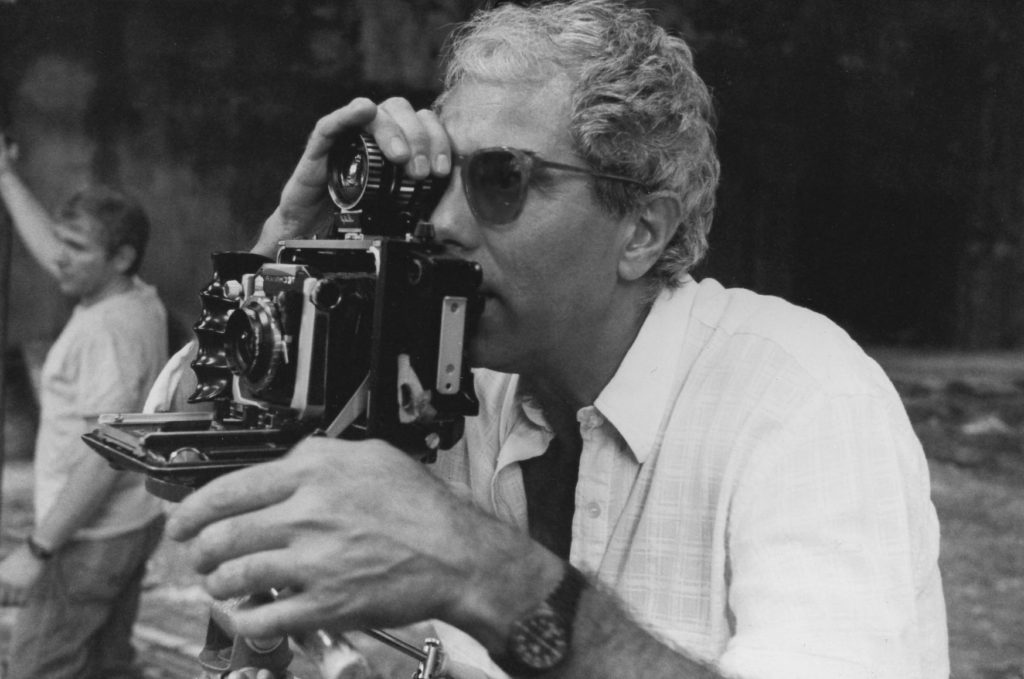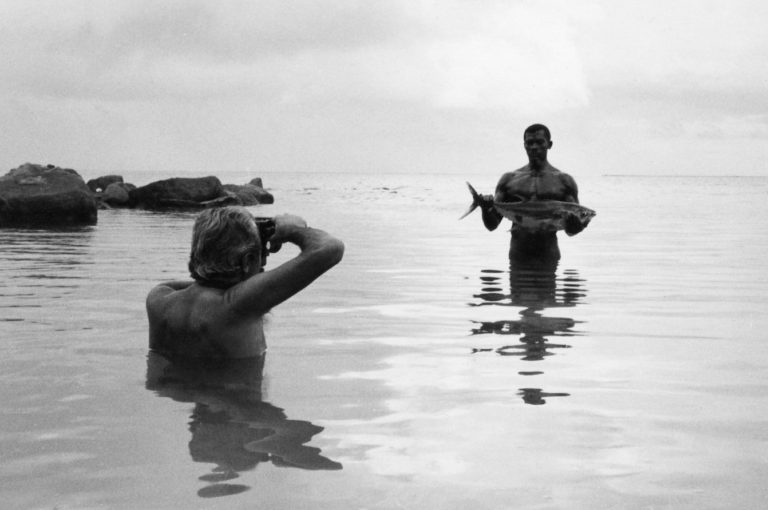Gian Paolo Barbieri
Gian Paolo Barbieri was born in Via Mazzini, into a family of textile wholesalers. It is in his father’s textile warehouse that he acquires the competence that will become helpful in his fashion photography.
He quickly moves his first steps in the theatrical field becoming an actor, camera operator and costume designer together with the “Trio”, a theatrical group formed with two friends, in remakes of some parts of famous movies such as Tobacco Road, The Life of Toulouse Lautrec and Sunset Boulevard.
Later on, he was entrusted with a small non-spoken part in ”Medea” by Luchino Visconti, with Sara Ferrati and Memo Benassi.
American noir cinema constitutes an important foundation for him, as he tried to figure out how the actresses could turn out to be so beautiful with the use of unique lighting making them look even more enchanting. Having never attended any photography school he would conduct innumerable experiments in his basement with light bulbs slipped into a stove pipe.
Movies gave him the sense of movement and the chance to bring Italian fashion from a studio set with a white backdrop, to the outdoors, giving it a different soul.
With the opportunity to move to Rome, and thanks to the first photos shot in pure “Dolce Vita” climate, Barbieri accepts the offer to work in Paris since he was considered talented in fashion photography. He so begins his career as assistant to the photographer of “Harper’s Bazar”, Tom Kublin, for a brief but intense period, since Kublin will later die of a stroke only 20 days later.
In 1964 he returns to Milan opening his first photographic studio, where he starts to work in fashion shooting simple samples and publishing photographic services on Novità, the magazine that subsequently, in 1966, it would become Vogue Italia.
From that moment he begins his collaboration with Condè Nast, also publishing on international magazines such as Vogue America, Vogue Paris and Vogue Germany.
Celebrities of the scene such as Diana Vreeland, Yves Saint Laurent and Richard Avedon, were part of his important history, along with collaborations with iconic actresses of all time from Audrey Hepburn to Veruschka and Jerry Hall.
A fundamental milestone of his course is the experience with Vogue Italy together with the carrying out of the biggest advertising campaigns for international brands like Valentino, Gianni Versace, Gianfranco Ferré, Armani, Bulgari, Chanel, Yves Saint Laurent, Dolce & Gabbana, Vivienne Westwood and many more with he interpreted the famous creations of the 80s, in concomitance with the conquest of the Made in Italy and of the Italian prêt-à-porter.
The nineties lead Barbieri to complete different journeys to discover cultures without limits united with the curiosity about faraway countries and ethnic groups, by nature and for the most disparate objects according to his inspirations, giving life then, to wonderful photographic books in whose places and faraway realities are depicted through his impeccable taste.
Even though the photos are taken outdoors and often immediate or fleeting, they turn out to be so “perfect” as to seem taken in a studio, blending the spontaneity of the population and of the places with the elegance and the style that typically mark him, managing to weave the spontaneity of the ethnographic photography to the glamour of the photography of fashion.
Listed in 1968 by the magazine Stern as one of the fourteen best fashion photographers in the world, today he wins the Lucie Award 2018 as Best International Photographer of Fashion.
His works have been showcased at the Palazzo Reale in Milan, MAMM in Moscow, Erarta Museum of Contemporary Art in Saint Petersburg, at Shanghai Museum and at Forte di Bard in Valle d’Aosta, to name just a few.
Moreover, some of his works belong to the collections of the Victoria & Albert Museum and the National Portrait Gallery of London, Kunstforum of Vienna, Musée du Quai Branly in Paris.
In 2017 Barbieri established his own Foundation, whose mission is to preserve, safeguard, protect, acquire, archive, catalogue, authenticate, and promote the archive and the works of its founder, for the purpose of spreading photographic culture in Italy and the rest of the world.
More recently, Barbieri’s work has been purchased by one of the most important fashion photography collections in the world, the Nicola Erni Collection, as well as by one of the largest contemporary art collections in the world, the Pinault Collection.
A docu-film about the artist’s life was presented to the public in 2022. Produced by Moovie in collaboration with the Foundation, directed by Emiliano Scatarzi and based on a script by Federica Masin and Emiliano Scatarzi, the film traces the artist’s life and opens a window onto the world that he has been a witness to.
Gian Paolo Barbieri, l’uomo e la bellezza was shown at the Biografilm Festival in Bologna where it received the Audience Award for Best Film. It was also shown at the Master of Art Festival in Bulgaria, where it won two prizes: Best Debut Documentary on Art and the award for the best documentary in the Photography category.


